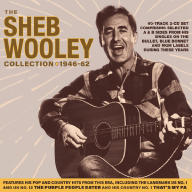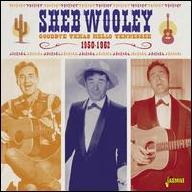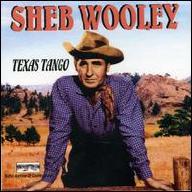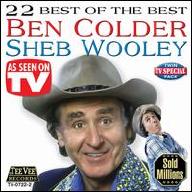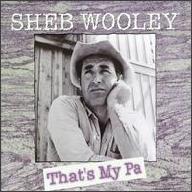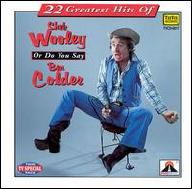Sheb Wooley was born in Erick, OK, on April 10, 1921. An avid rider from an early age, he was competing in local rodeos before he was ten years old, and by the time he was a teenager was one of the best young riders on the circuit. Music was also one of his interests, and Wooley got his first guitar when his father swapped a shotgun for the instrument. The family was poor, and living was very tough during the 1930s; more than once their crops were virtually blown away by the dry dust bowl winds.
Wooley led his own country band in high school, but music didn't offer the prospect of a living, and he made his living for a time working the oil fields of Oklahoma as a welder. As with many Oklahomans looking for a better future, Wooley headed to California in the late '30s and nearly earned a living at a packing plant, moving crates of oranges. By then Wooley was married to Melba Miller, the older sister of future country music star Roger Miller. When World War II broke out, Wooley found himself labeled 4-F (ineligible for military service) because of injuries he'd suffered as a rodeo rider, and he spent much of the war working in defense plants.
In 1945, he made his first records for the Bullet label in Nashville, and began appearing as a singer/guitarist on WLAC; the job paid nothing, but allowed him to get paid work elsewhere. His Bullet sides were cut at WSM, home of the Grand Ole Opry, but they saw almost no play or exposure of any kind.
A year later he moved to Fort Worth, TX, and got a regular spot on radio there, sponsored by Calumet Baking Powder. Finally, in 1949, at the suggestion of a friend at WSM, Wooley decided to take the plunge and head for California in hope of getting some movie work. Around this same time, he was signed as a songwriter to Hill Range, the publishing company, which, in turn, led to his being signed by the newly founded MGM Records in 1950. MGM already had a legendary figure in its roster, in the person of Hank Williams, but country music was booming, and there was room for as many worthwhile talents as the label could find.
He also took acting lessons in the hope of getting some work on the screen. Wooley succeeded more than he could have hoped in this capacity, appearing in small parts in 40 feature films, beginning with #Rocky Mountain, Errol Flynn's final Western, in 1949. His most notable screen came two years later in the classic #High Noon (1952), in which he played Ben Miller, the leader of the outlaw gang gunning for town marshal Gary Cooper. He also played an important supporting role in the historical drama #Little Big Horn (1951), starring Lloyd Bridges and John Ireland, and was seen in #The Man Without a Star (1955), #Giant (1956), and #Rio Bravo (1959), starring John Wayne.
Amid all of his film work, Wooley continued recording and writing songs. It wasn't until 1958, however, that he had a hit of any consequence, and it was a most unexpected song. Wooley had written several songs that were hits for other singers, most notably Are You Satisfied, which got to number 11 on the country charts as recorded by Rusty Draper in 1955. Wooley had always displayed a gift for parody, and the song he finally scaled the pop charts with was Purple People Eater, a parody of various pop culture crazes including monster movies (some people at the time suggested -- incorrectly -- that the sci-fi/horror classic #The Blob, starring Steve McQueen, which was released at around the same time as Wooley's song, was virtually a film of the song). Wooley had to fight to get the song released, and it ultimately became one of the biggest hit singles in the history of MGM Records.
He was unable to follow up the success of Purple People Eater, however, and it wasn't until 1962 that he had another hit, this time a country chart-topper called That's My Dad.
In 1958, Wooley was cast in the role of Pete Nolan in the television Western #Rawhide, starring Eric Fleming and Clint Eastwood, which premiered in January of 1959. He later wrote some scripts for the series as well, and in 1959, in order to fulfill public demand for a recording of the series' title song, he recorded his own version of the #Rawhide theme song and an entire album of Western songs, which failed to chart. He later recorded an album of folk-style material that was released in the wake of the MGM wide-screen epic blockbuster movie #How the West Was Won, but this also failed to catch on with the public.
His film work continued during this time, and it was because of movie and television commitments that he was unable to record the song Don't Go Near the Indians. Instead, former movie cowboy/singer Rex Allen recorded it and had a hit with it. In response to his bad luck, Wooley cut a joke parody follow-up to the song, entitled Don't Go Near the Eskimos, and created a new, inebriated comic persona to present it. "Ben Colder" was born with Don't Go Near the Eskimos," and for the rest of his career Wooley -- in a manner anticipating the lot of David Johansen/Buster Poindexter -- had to split his time between appearances as "straight" country/cowboy singer Sheb Wooley and drunken comic Ben Colder. (Some of the other names that Wooley had considered for this persona, according to one source, were "Ben Freezin" and "Klon Dyke"). In 1969, when the country music showcase #Hee Haw went on the air, Wooley became the show's resident songwriter, providing the series' comic musical numbers.
Ben Colder went on to have several more hits, including Almost Persuaded No. 2, and in 1968 the Colder persona was voted Comedian of the Year. Wooley continued recording under both guises into the 1980s, although his last chart single in either persona dated back to 1971.
In 1998, Wooley was diagnosed with leukemia and spent the next few years in and out of hospitals battling the condition. On September 16, 2003 Sheb Wooley passed away at the age of 82. The previous year Wooley had been honored by Tennessee Senator Fred Thompson, who referred to the singer/songwriter/actor as an "American treasure." ~ Bruce Eder, Rovi


